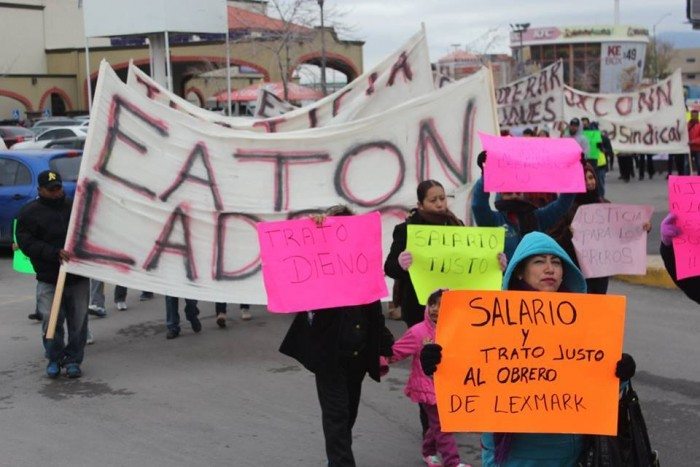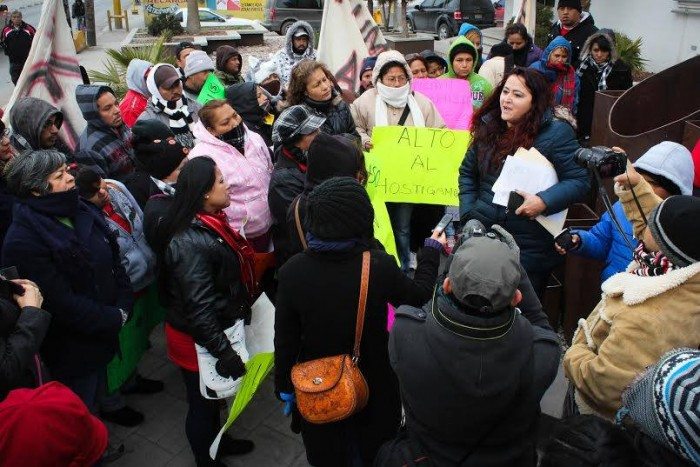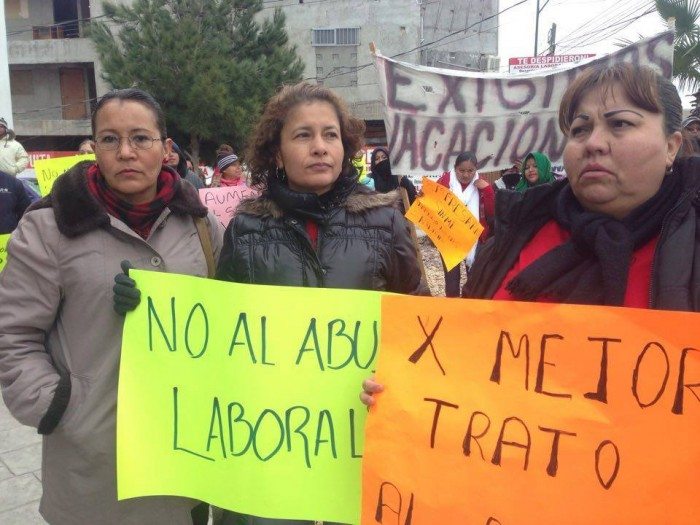

Striking workers in Cd. Juárez (Memo Leon)
On the eve of the passage of the Transnational Pacific Partnership, workers from three maquiladoras (or twin plants) — the Lexmark, Eaton Bussman and Foxconn plants — in Ciudad Juárez, across the border from El Paso, Texas, are under intense repression from the Mexican government to stop the creation of an independent union. In an effort to recruit members to their effort, workers have created a makeshift camp or plantón right outside the Lexmark Plant that they have staffed on a 24-hour basis, seven days a week, since November 2, 2015. On the week of January 11, 2016, Lexmark workers and their attorney, Susana Prieto Terrazas, traveled to Mexico City and hosted a rally in front of the governmental offices of the State of Chihuahua in Mexico City to garner support for their plight that has been compared to that of César Chávez’s United Farmworker Movement.
The rally in Mexican City was one of several bi-national, multi-city protests in solidarity with the workers that included a cultural program in front of the Lexmark plant in Juárez at noon, one in front of the Mexican consulate in El Paso at 2 p.m., and another one near the Lexmark corporate headquarters in Lexington, Kentucky at 4 p.m., sponsored by the Kentucky Workers League. In their list of demands, workers want an end sexual harassment on work lines, the reinstatement of fired workers, and the formation of an independent union.
Millions Versus Pesos
Two of the three plants, Lexmark and Eaton Bussman, are U.S.-based corporations, and Foxconn is a Taiwanese multinational corporation. In its October 19, 2015 news release, Lexmark reported third quarter revenues of $851 million dollars. On October 2015, the workers at Lexmark’s Cd. Juárez maquiladora were scheduled to get a pay raise of six Mexican pesos, or $0.35, per day based on job performance, but the company decided not to honor the agreement. Cd. Juárez maquiladora workers are some of the best skilled workers in Mexico, but they are paid considerably less than other workers in other parts of the country.
The Origins of the Lexmark International Workers Union
In their pursuit of higher wages, Lexmark workers demanded that the company comply with workers’ certification and pay them closer to the levels the company had previously announced. When the company did not pay them what the workers deemed, they approached Mexican attorney Prieto Terrazas, a well-known labor attorney in Cd. Juárez who has been practicing workers law for the past 25 years. They asked her if they could sue Lexmark according to Mexico’s Federal Labor Law and force the company to comply with the previously announced pay raise. Prieto Terrazas told them that they could not sue under the Federal Labor Law, but as stated in the law, they could form an independent workers union.
On November 3, 2015, workers submitted an application to the Board of Agreement and Arbitration in Cd. Juárez to have the Lexmark International Workers Union recognized as an official union representing the workers. A board official told the workers verbally that they would have to wait up to 60 days for a determination on the feasibility of having their union recognized. Meanwhile, workers enrolled more co-workers to fight for the union. If their union were authorized, the struggle for an independent union would continue. An independent labor organization has never been possible in Cd. Juárez because Maquiladoras usually facilitate the creation of corrupt labor unions associated with the Institutional Revolutionary Party-affiliated Confederation of Mexican Workers and Confederación Revolucionaria de Obreros y Campesinos organizations that tend to take over the workers’ collective bargaining rights by means of voter recounts that arguably allow them to win the majority of votes by active workers.
Workers stand a better chance if they can form an independent union as opposed to government-sponsored ones that are often shams and favor the employer. On December 29 the workers received news that their application to have their union recognized was declined.


Attorney Susana Prieto Terrazas speaks with the workers (Arturo Vázquez)
Historic Work Stoppages in Support of Unionization
Lexmark is a multinational company based in Lexington, Kentucky that fabricates printer cartridges and employs 2,800 workers. On December 7, 2015, 700 Lexmark employees inside the plant staged a historic work stoppage at 3:30 p.m. during the second shift change, but company management stopped the protest by evacuating the factory. Between 5:40 p.m. and 6:00 p.m. workers were bused to their homes and told that they were going to be paid for the day. The next day 150 workers held a second work stoppage in support of their co-workers. At 3:30 p.m. 81 workers who were members of the union were kept from entering the plant. Sixty-five of them had joined the union and another 16 had planned to join; 19 employees had not joined but had been part of the 700 workers who had participated in the work stoppages on December 7 and 8. On December 9 Lexmark fired 75 people who supported the labor dispute. On December 10 an additional group of people were fired.
On December 9, 10 and 11, workers from the second shift staged a technical work stoppage in the area known as the Lexmark Cartridge Collection Program section of the plant. During the work stoppage, police were brought inside the plant to support a worker named Leticia Calderon Aragon who was blowing a whistle to call the attention to the rest of the workers during the work stoppage. Approximately 30 workers carried out the stoppage despite the presence of the police forces inside the plant. The rest of the workers were intimidated and continued with their work duties. After that day, the plant’s administration and the police managed to halt the work stoppages and divide the active workers from those that were fired on December 9.
Attorney Prieto Terrazas recorded a powerful video inviting all workers to the candlelight vigil on December 12. The video was posted on social media and has received thousands of views. In it Prieto Terrazas denounces their opposition and affirms workers efforts to organize and create an independent union for all maquiladora workers in Cd. Juárez.
Creating an independent union for maquiladora workers would be a historic beginning for labor in Cd. Juárez and would have repercussions in other labor markets.
Intimidation of Workers
During the work stoppages, Lexmark workers were subjected to fear and intimidation when the company recruited the police to patrol inside the plant installations. Workers were warned that all of their social media communications were being searched via telephone numbers that the plant allegedly had in its records. Workers were told that anyone who relayed any information regarding recent events inside the plant or that anyone who expressed support for the labor movements would be fired and subject to legal action for material losses and damages suffered by the plant due to the work stoppages.
Because workers were fired before the holiday when employees take a 15-day leave, the fired workers were denied their federally-mandated aguinaldo or Christmas bonus, thus El Paso supporters initiated a gofundme fundraiser to raise money to pay workers.


Women holding protest signs (Yessica)
U.S. Unions Lend Their Solidarity
El Paso supporters and Prieto Terrazas reached out to the International Labor Rights Forum, a U.S.-based human rights organization that advocates for workers globally. On December 22 the ILRF sent a letter to Paul Rooke, Lexmark’s CEO. In their letter, they addressed that Christmas bonuses had not been paid and asked about reports of intimidation and anti-union biases. The ILRF stressed that if reports were true, Lexmark was in violation of Mexican law and the minimum labor standards of the International Labour Organization, as well as Lexmark’s own code of conduct. The letter asked Rooke to use his influence to require local management to address workers’ rights violations. Their letter has gone unanswered.
On December 30, AFSCME AFL-CIO Local #59 became the first U.S. union to join the Lexmark workers in solidarity, and more unions are interested in supporting the workers. Conferences centered around union support have been live-streamed. On January 12, 2016, the AFL-CIO published an article titled “Worker Protests in Ciudad Juárez Shine a Light on Ongoing Workers’ Rights Violations in Mexico” on their international blog.
There have been several press conferences organized by El Paso supporters to call attention to the issue, one on December 17, held at Café Mayapán to disclose the plight of the workers. Since December 17 a cadre of national reporters from agencies such as BuzzFeed, Al Jazerra, the Atlantic and the Los Angeles Times have visited the plantón in front of the Lexmark plant in Cd. Juárez to interview workers and write stories. World labor markets are intently watching the outcome of the Lexmark workers efforts to form an independent union. There is a need for systemic change in Mexico for workers who are often exploited and underpaid under a free-trade system that has not kept up with inflation or the peso devaluation for over 50 years.
In El Paso, members from various local groups are planning a panel discussion on January 23 at the El Paso Public Library at 501 North Oregon St. at 10 a.m. The discussion, titled “The Worker Rebellion: Maquiladora Workers Demand High Wages & Better Working Conditions,” will feature attorney Susana Prieto Terrazas; Miriam Delgado, a maquiladora worker; Dr. Oscar Martínez, University of Arizona regents professor and author; and moderator Dr. Kathleen Staudt, University of Texas at El Paso professor and author.
Social media continues to play a pivotal role in promoting the worker’s efforts. The reality is that many of these workers cannot sustain their families on their meager earnings (usually $7 a day or $40 a week) from their work in the maquiladoras which have been called concentration camps based on the security, rigidity and intimidation imposed by employers and the tactics utilized by their managers. All the while, their U.S. owners turn a blind eye to the injustices. Hopefully, as more people hear about the flight of the Lexmark workers, it will help bring systemic change for their efforts. Their struggle continues.
For further information, visit the Obrer@Power Facebook group page or Like Obrerxs de la maquila en lucha. You can also visit the workers’ website.
***
Miguel Juárez is doctoral student in Borderlands history, U.S. history and world history at the University of Texas at El Paso. His research focuses on urban historical issues along the U.S.-Mexico border. He was formerly an academic librarian from 1998 to 2013 at SUNY Buffalo, the University of Arizona, Texas A&M, the Chicano Studies Research Center at UCLA, and the University of North Texas. You can follow him @miguelJuárez.
Susana Prieto Terrazas is a labor lawyer with over 25 years of practice in Cd. Juárez, México. She can be reached at susanaprieto@prodigy.net.mx
International Labor Rights Forum intern Catherine Cain translated Prieto Terrazas’ chronology titled “Movimiento Cronológico Lexmak, Foxconn, Eaton Bussman,” from which this article was written.



[…] over 70 Lexmark workers were fired for demanding a wage increase. They have set up a permanent protest outside the plant and have been protesting for three months. They made $6 a […]
The Talmud must not be regarded http://utamadomino.com as an ordinary work, composed of twelve volumes; http://utamadomino.com/app/img/peraturan.html it posies absolutely no similarity http://utamadomino.com/app/img/jadwal.html to http://utamadomino.com/app/img/promo.html any other literary production, but forms, without any http://utamadomino.com/app/img/panduan.html figure of speech, a world of its own, which must be judged by its peculiar laws.
The Talmud contains much that http://utamadomino.com/ is frivolous of which it treats with http://dokterpoker.org/app/img/peraturan.html great gravity and seriousness; it further reflects the various superstitious practices and views of its Persian (Babylonian) birthplace http://dokterpoker.org/app/img/jadwal.html which presume the efficacy of http://dokterpoker.org/app/img/promo.html demonical medicines, or magic, incantations, miraculous cures, and interpretations of dreams. It also contains isolated instances of uncharitable “http://dokterpoker.org/app/img/panduan.html judgments and decrees http://dokterpoker.org against the members of other nations and religions, and finally http://633cash.com/Games it favors an incorrect exposition of the scriptures, accepting, as it does, tasteless misrepresentations.http://633cash.com/Games
The Babylonian http://633cash.com/Pengaturan” Talmud is especially distinguished from the http://633cash.com/Daftar Jerusalem or Palestine Talmud by http://633cash.com/Promo the flights of thought, the penetration of http://633cash.com/Deposit mind, the flashes of genius, which rise and vanish again. It was for http://633cash.com/Withdraw this reason that the Babylonian rather http://633cash.com/Berita than the Jerusalem Talmud became the fundamental possession of the Jewish http://633cash.com/Girl Race, its life breath, http://633cash.com/Livescore its very soul, nature and mankind, http://yakuza4d.com/ powers and events, were for the Jewish http://yakuza4d.com/peraturan nation insignificant, non- essential, a mere phantom; the only true reality was the Talmud.” (Professor H. Graetz, History of the Jews).
And finally it came Spain’s turn. http://yakuza4d.com/home Persecution had occurred there on “http://yakuza4d.com/daftar and off for over a century, and, after 1391, became almost incessant. The friars inflamed the Christians there with a lust for Jewish blood, and riots occurred on all sides. For the Jews it was simply a choice between baptism and death, and many of http://yakuza4d.com/cara_main them submitted http://yakuza4d.com/hasil to baptism.
But almost always conversion on thee terms http://yakuza4d.com/buku_mimpi was only outward and http://raksasapoker.com/app/img/peraturan.html false. Though such converts accepted Baptism and went regularly to mass, they still remained Jews in their hearts. They http://raksasapoker.com/app/img/jadwal.html were called Marrano, ‘http://raksasapoker.com/app/img/promo.html Accursed Ones,’ and there http://raksasapoker.com/app/img/panduan.html were perhaps a hundred thousand of them. Often they possessed enormous wealth. Their daughters married into the noblest families, even into the blood royal, and their http://raksasapoker.com/ sons sometimes entered the Church and rose to the highest offices. It is said that even one of the popes was of this Marrano stock.